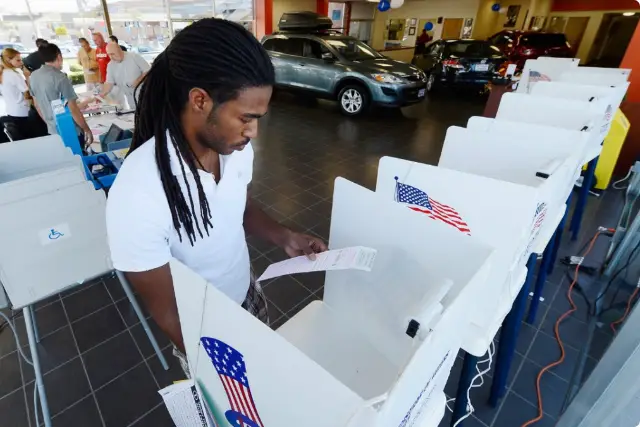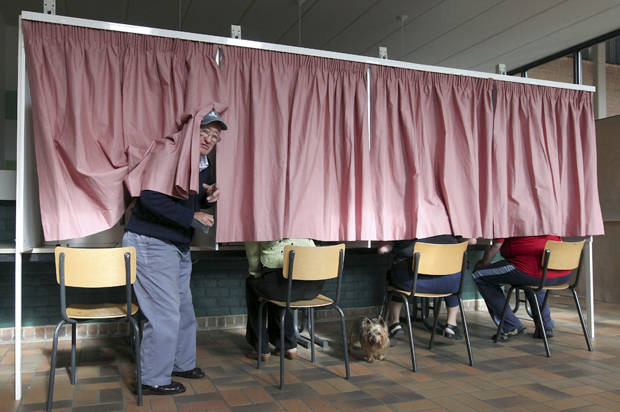Who Should Vote?
Allowing uninformed voting isn’t just irresponsible, it’s reckless.
By Aaron Lynch, Front Range Community College
Democracy and freedom are often considered to be the cornerstones of U.S. culture, so it seems natural that everyone is free to participate in the democratic part of our republic through the act of voting.
Unless you have committed a felony, the right to vote is afforded to each and every citizen at the age of eighteen.
However, through unfortunate circumstances that aren’t necessarily anybody’s fault, there are others who should not be afforded this right: Those who lack the mental capacity to do so.
This assertion has no bearing on the political scale, and this isn’t a left vs. right piece. This is an intelligent person who’s worried that the ignorant, incapable members of our species will drag all of mankind down into extinction with them.
So, for the love of humanity, we must stop handing them the right to vote.
You Know Who I’m Talking About
I don’t mean that everyone who has ever voted against me is a half-wit, but many people (on both sides) decide their votes months in advance, completely disregarding the election cycle and debates. They’re simply not well informed enough to make a responsible decision with a vote that not only affects U.S. citizens, but an ever-increasing number of global citizens as well.

The presidential debates of 2016 were considered huge successes because of their viewership; for the first time, debates were streamed live on social media, and when combined with the reality TV campaign of the Trump administration, the debacle drew 84 million total viewers.
Assuming everyone who viewed the debate was eligible, that means that 84 of 230 million voters, roughly 36 percent, watched the first debate. There were even fewer viewers for the following debates, though the number are still a 10 percent improvement from 2012.
According to Pew Research, over 50 percent of eligible voters ignored campaign advertising as well, and who could blame them? It seems that Americans have grown indifferent to what their politicians have to say.
It’s also an unfortunate fact of nature that some humans are just born unfit to vote, whether it’s due to a low I.Q. or bad circumstances. Their fears are easily manipulated; they’re unable to think critically about politicians; they suck tax dollars out of government benefit programs with no intentions of finding work; they tote guns and holy books and roll coal, all while believing they’re smarter than 97 percent of climate scientists. There’s a whole slew more of moderately true stereotypes at the bottom of the mankind barrel, casting their ignorant vote and displacing your informed one.
In addition, some media seek out people like this out to hold them up as an example of how bat-shit the other side of the aisle is. For example, last year “The Daily Show” aired multiple skits featuring the confused ramblings of less-than-intelligent Trump supporters; on the other hand, Jesse Watters (of Fox News) had no problem doing literally the same thing at a Bernie Sanders rally. Aside from good ratings, the only thing their skits create is hyper-partisanship.
When I was little, my parents would send us to bed or to play outside when they needed to do serious work and have grown-up conversations. It was nothing personal; it’s just that it’s easier to hear each other when there aren’t a bunch of screaming children everywhere.
Likewise, not letting all citizens vote is nothing personal, but it seems that we’re approaching a crossroads in the U.S., and it’s time that we stopped fucking around. Let’s put away the screaming children away so the grown-ups can talk.
How It Was Supposed to Be
The U.S. Constitution leaves the states to determine their own electoral systems, and for the first thirteen presidential elections, the states tinkered with various models.
Some used a district-based system, while others had state legislatures choose electors; at the time, electors may have been chosen by the people, but they voted by their own determinations. This was meant to act as a check on irresponsible voting and stifle the “tyranny of the majority” inherent in pure democratic systems.
However, in 1800, Virginia became the first to use a winner-take-all, popular voting system, and their reasoning was surprisingly pragmatic. State leaders wanted to maximize support for their party’s candidate, and once this advantage became obvious, the rest of the states had to make the switch to keep up. The winner-take-all system was implemented solely for the sake of protecting party interests.

James Madison, the father of the Constitution, had not anticipated the winner-take-all method, and feared the abuse it would make possible. He and other founders would denounce it for the rest of their political careers to no avail.
“It was equally desirable, that the immediate election should be made by men most capable of analyzing the qualities adapted to the station, and acting under circumstances favorable to deliberation, and to judicious combination of all the reasons and inducements which were proper to govern their choice,” said Alexander Hamilton.
The framers of the constitution never wanted a popular voting system, because they knew better than to trust the mob mentality of the mostly uneducated public of the time.
So, Who Gets to Vote?
This part involves an overhaul of standardized testing. Since intelligence exists in many forms, all should be given a way to demonstrate not only skills that they’ve dedicated themselves to learning, but also their ability to critically analyze information they’re familiar with. I suggest setting up an online testing protocol for all fields of work, each field (and even sub-field) getting its own test of 20-30 questions.
Once a person proves their mental ability, they must then prove they’ve been following recent political events well enough to understand the premises of each campaign. These tests would be over policy disputes and controversies that have taken place throughout the election cycle, and may be as short as ten questions depending on the year.
Both these tests would be required of all citizens and would be retaken every two years; anyone who failed to score a least a 75 percent on both tests would not be registered to vote. However, all citizens are welcome to test in any given election cycle to determine their mental eligibility regardless of past failures, this way the door is still open and nobody is being permanently robbed of their right to vote.
If the U.S. is ever going to end the hyper-partisanship that divides the people and cripples the government, eliminating irresponsible voting is the perhaps the best place to start.












